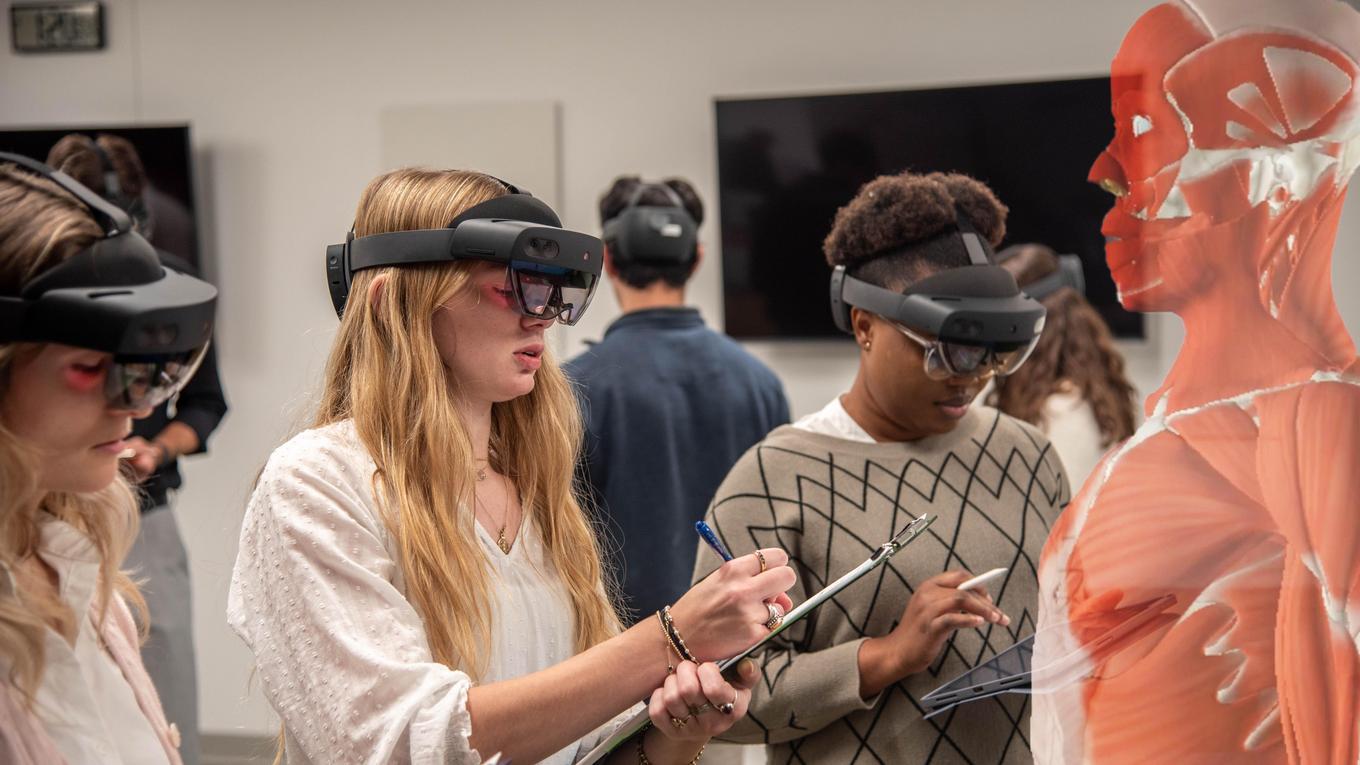Master's in Biomedical Sciences (MBS)
Request Info Application Opens Oct 1 Attend a Virtual Info Session
Be prepared to transform the world with Duquesne's Master's in Biomedical Sciences (MBS). Built to help you advance your career in medicine through a greater understanding of the structure and function of the human body, this master's program is the only one in the world using HoloAnatomy 3D technology!
Professionals with advanced degrees are needed in healthcare and biomedical research today, and in the future as these fields evolve and expand. This Master's in Biomedical Sciences degree program offers:
- Easy application process with no MCAT/GRE requirement
- Convenient full-time, 10-month program (32-credit hours)
- Hands-on learning experiences and community outreach opportunities
Accreditation
Duquesne University’s Master’s in Biomedical Sciences (MBS) program is accredited as part of the larger university under the Middle States Commission on Higher Education (MSCHE).
Program Information
A Master's in Biomedical Sciences (MBS) degree from Duquesne University in Pittsburgh, PA will prepare you for medical school or an advanced healthcare career in 10-months.
Program Type
Major
Degree
Master's
Duration
10 months
Required Credit Hours
32
You have plans for medical school or advancement in your current healthcare career,
we can help you get there. Contact us directly with any questions about the program
or admissions process.You Will Have The Support To Reach Your Bigger Goals in Medicine
Contact Us for a Fall 2026 Start
MBS Program FAQs
Have a question? Start here first. If you don't get the answer you are looking for then we will be happy to help.
$46,000 is the total tuition for the 1 year program. Scholarships and financial aid options are available.
Yes, there are merit and need-based scholarships awarded at the discretion of the MBS committee.
The MBS application cycle opens October 1 and we operate on a rolling admissions process until August 1.
Students get to choose their modality of participation for the MBS program: in-person/residential OR online/asynchronous. The asynchronous modality is much more flexible to accommodate the lifestyle of working adults, but the quiz and exam schedule will operate on the same timeline as residential students. The biggest difference between modalities is the use of recorded lectures for asynchronous students versus live lectures and engagement with Nasuti College of Medicine faculty for residential students.
Both residential and asynchronous students have been successful in the program previously, and able to take advantage of the pathway to the Nasuti College of Medicine DO program. It is recommended that asynchronous students stay in regular contact with their advisors and faculty lecturers so that the MBS committee can provide them with a strong letter of recommendation if requested.Yes, students can change modalities at the start of a new semester. They do this by submitting a formal request for modality change to the Executive Director of Admissions, Dr. Michael Rice.
Yes, there is a pathway between the Nasuti College of Medicine's MBS and DO programs. So long as students achieve and maintain a 3.2+ GPA in the program, attain an MCAT score of 500+, submit a strong committee letter of recommendation from the MBS committee, and complete a mock interview, they are guaranteed an interview for the DO program.
No, the MBS to DO pathway is primarily designed for students who will be applying to medical school for the first time.
Application & Prerequisite Requirements
You'll have a competitive edge and be prepared to demonstrate your ability to succeed
in medical school or any health profession with Duquesne's MS Biomedical Sciences.
Our faculty will work alongside you with coursework that combines biomedical sciences
and clinical application with hands-on learning opportunities that:
- Expands your scientific knowledge with first-semester medical school courses.
- Explores anatomy system-by-system with 3D mixed reality system, HoloAnatomy.
- Integrates service opportunities that impacts the health of Pittsburgh communities.
- Hones critical thinking skills to quickly solve clinical issues.
- Prepares medical school candidates for MCAT exam.
Application Requirements
- Master's in Biomedical Sciences applicants are selected on a rolling admission's schedule.
- No MCAT/GRE is required.
- Bachelor's degree with a required minimum cumulative GPA of 2.75 and a science GPA of 2.50.
- One letter of reference from an employer, science professor, pre-health committee or advisor, or health professional(s) familiar with your academic ability.
- A personal statement as to why you are applying to Duquesne's MBS program.
Prerequisite Coursework Requirements
- Biological Sciences - 8 credit hours
- Physics - 8 credit hours
- General and/or Inorganic Chemistry - 8 credit hours
- Organic Chemistry - 8 credit hours
- English and/or Composition - 6 credit hours
Additional preferred coursework (not required):
- Biomedical Sciences - 6 credit hours (200 level or above)
- Coursework may include: anatomy, physiology, biochemistry, immunology, microbiology, virology and genetics.
- Other coursework may be accepted.
Applications for Fall 2026 Start October 1
MBS Course Descriptions
You'll be prepared to meet your goals with these Fall and Spring courses.
Human Anatomy I is a regional-based anatomy course that delivers the knowledge necessary to understand and apply human anatomy, histology, and embryonic development to normal human physiology and pathophysiology. Students will study human anatomy of the upper and lower extremities, back, and thorax. The course will utilize lectures and HoloAnatomy laboratories.
3 credits, Fall semesterHuman Physiology I provides an understanding of the functions of the body at the level of tissues and organs to provide a foundation for further exploration of disease processes. The topics covered in this course include musculoskeletal, neurological, cardiovascular, and pulmonary systems.
3 credits, Fall semester
Cell and Molecular Biology provides an understanding of the functions of the body at cellular and sub-cellular levels to provide a foundation for further exploration of disease processes. The course will examine the biochemical activity of the cell and demonstrate understanding of the cellular structure, nucleic acid structure and function, synthesis of proteins, regulation of gene expression, the function of cellular organelles, and cellular metabolism.
3 credits, Fall semester
Foundations of Microbiology provides the foundational knowledge and framework of the major classes of bacteria, viruses, parasites, and fungi and how they relate to the pathologic basis of disease. The structure, replication, and management of these microbes as well as host-pathogen interactions are discussed.
2 credits, Fall semester
Foundations of Immunology provides the fundamentals of the immune system. The focus will be on innate and adaptive immunity, immune responses to pathogens and other foreign materials, and dysregulation of the immune system.
2 credits, Fall semester
Medical Applications I provides the student with a comprehensive foundation in general chemistry, organic chemistry, general biology, biochemistry, physics, psychology and sociology. The course will also focus on the development of critical analysis and reasoning skills.
3 credits, Fall semester
Human Anatomy II is a regional-based anatomy course that delivers the knowledge necessary to understand and apply human anatomy, histology, and embryonic development to normal human physiology and pathophysiology. Students will study human anatomy of the abdomen, pelvis, head, and neck. The course will utilize lectures and HoloAnatomy laboratories.
3 credits, Spring semester
Human Physiology II aims to provide an understanding of the functions of the body at the level of tissues and organs to provide a foundation for further exploration of disease processes. The topics covered in this course include renal, digestive, and endocrine systems.
3 credits, Spring semesterFoundations of Pharmacology provides the foundational knowledge and framework to apply the principles of pharmacology needed in evidence-based medicine. The course covers the foundational concepts of pharmacology including pharmacodynamics, pharmacokinetics, major classes of drugs, and their purposes and mechanisms in the rational treatment of disease.
3 credits, Spring semester
Pathologic Basis of Disease builds upon the foundations of anatomy, physiology, cell biology, immunology, microbiology, and pharmacology to explore mechanisms of disease initiation, progression, and outcomes. The changes in structure and function of cells, tissues, and organs will be examined as they relate to disease, injury, inflammation, and tumorigenesis.
2 credits, Spring semester
Evidence Based Medicine provides a foundational framework for scholarship in the health sciences. The foundations of this course are clinical study design, responsible conduct in research, the scientific method, the research process and methodology, literature searches, and biostatistics. In addition, this course will explore the topics of epidemiology, social determinants of health, analyzing relationships between variables, proper methods of reading and learning from scientific literature and applying information from clinical literature.
2 credits, Spring semester
3 credits, Spring semester




